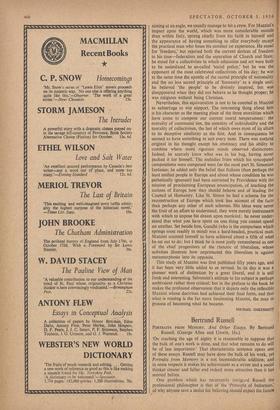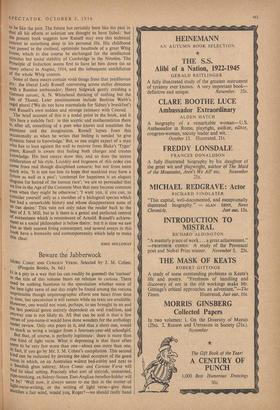Bertrand Russell PORTRAITS FROM MEMORY. And Other Essays. By Bertrand
Russell. (George Allen and Unwin, los.) 'ON reaching the age of eighty it is reasonable to suppose that the hulk of one's work is done, and that what remains to do will be of less importance.' That characteristic sentence opens one of these essays. Russell may have done the bulk of his work, yet Portraits front Memory is a not inconsiderable addition; and in some respects it makes his achievement as a writer and a social thinker clearer and fuller and indeed more attractive than it has seemed before.
One problem which has recurrently intrigued Russell the professional philosopher is that of the 'Principle of Induction,' of why anyone save a zealot for believing should expect the future
to be like the past. The future has certainly been like the past in that all his efforts at solution are thought to have failed : but the present book suggests how Russell may owe this technical interest to something deep in his personal life. His childhood was passed in the civilised, optimistic beatitude of a great Whig house, which in due course he exchanged for the intellectual stimulus but social stability of Cambridge in the Nineties. The Principle of Induction seems first to have let him down (as so many others) in August, 1914, and the subsequent annihilation of the whole Whig cosmos.
Some of these essays contain vivid things from that prediluvian era: the liberal Lady Russell conversing across stellar distances with a Russian ambassador; Henry Sidgwick gently crushing a German savant; A. N. Whitehead thinking of nothing but the Isle of Thanet. Later reminiscences include Beatrice Webb's regal plural ('We do not have marmalade for Sidney's breakfast') and Russell's own sudden and strange intimacy with Conrad.
The brief account of this is a nodal point in the book, and it lays bare a notable fact: in this sceptic and mathematician there is, after all, something of a poet who knows and nourishes the Motions and the imagination. Russell lapses from this occasionally as when he writes that feeling is needed `to give dynamic force to knowledge.' But, as one might expect of a man who has to lean against the wall to recover from Blake's `Tyger' Poem, Russell is aware that feeling both charges and creates knowledge. His best essays show this, and so does the serene exhilaration of his style. Lucidity and largeness of this order can come from real though disciplined concern; but not from mere quick wits. 'It is not too late to hope that mankind may have a future as well as a past'; 'contempt for happiness is an elegant disguise for hatred of the human race'; 'we are so persuaded that we live in the Age of the Common Man that men become common even when they might be otherwise'; 'I want you, if you can, to Consider yourself only as a member of a biological species which has had a remarkable history and whose disappearance none of us can desire.' This vein not only takes the reader back to the best of J. S. Mill, but in it there is a genial and perfected control of earnestness which is reminiscent of Arnold. Russell's achieve- ment as a social philosopher is below theirs : but it is time we saw him as their nearest living counterpart, and several essays in this book have a humanity and contemporaneity which help to make this clear.
JOHN HOLLOWAY



















































 Previous page
Previous page